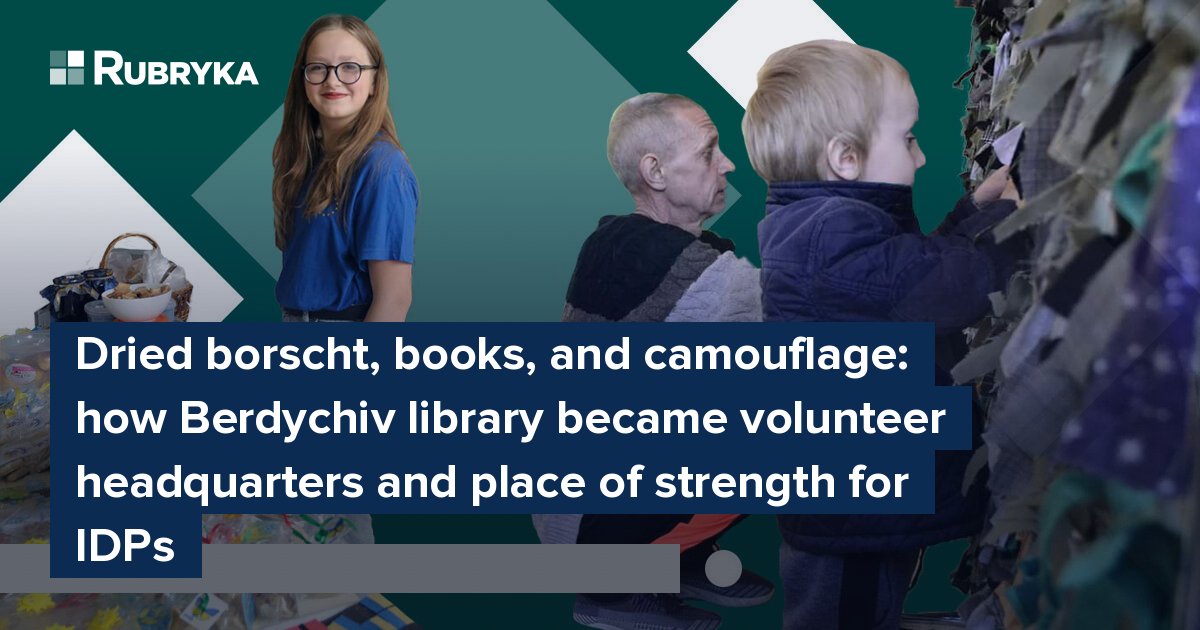
This is the Berdychiv community's Public Library, which also has the Youth Center. Since February 24, employees have actively volunteered without stopping peacetime work. Rubryka discovered how the library became a hub for volunteers and a "place of strength" for internally displaced people, how it continues to work in new conditions, and why they need camouflage.
What is the problem?
When you need a safe space
The Zhytomyr region became one of the regions that suffered greatly after russia's full-scale invasion. The impact of the war was felt immediately. At the same time, it became clear that Ukrainians needed to unite and help to win. Regardless of age, the field of activity, and experience, Ukrainians began to take the initiative to speed up the victory. They have gathered in districts, villages, and cities for over half a year to weave nets and camouflage robes, sew linen, or look for military equipment.
Berdychiv, a city in the Zhytomyr region, has become a temporary home for migrants from the most dangerous areas. Therefore, the locals started to help immediately, considering the military's requests. The city's Public Library became one of the headquarters where volunteers provided aid. Its employees could not sit idle, so they began coordinating from the very first days.
In the first month of the full-scale war, more than 700 people visited the library. Many visitors are migrants from Bucha, Mykolaiv, Irpin, and Kharkiv. The library eventually started working as a hub for displaced people in February but officially opened for readers on March 9.
"In the first days of the war, we immediately went to work. We only took a break for a day or two because everyone was initially confused. But we didn't wait for anything but went to work. This is what made us feel how cohesive our library environment is. Everyone said they wanted to be useful," says Tetiana Kushchuk, director of the library.
Tetiana is 49 years old; for 22 years, she has been working here. She says that her team is not panicking but understands that life goes on:
"We adopted a motto that we use everywhere: 'And every day everything is just beginning for us.'"

What is the solution?
Hub for volunteers and aid to displaced persons
The library team consists of 15 people. Exhibitions, presentations, meetings, master classes, and training are held here. The library has a free space for young people, M-Formation, which is engaged in implementing educational, particularly informal, leisure, cultural and artistic projects.
"Throughout the war, we are focused and uplifted because we understand that only by being active can we bear this burden. We learned to work effectively and amicably in peacetime, so during the war, we felt united and could rally others who came to help. They didn't feel confused but became even more active. We are here, and we are focused."
The library has been working with internal migrants since 2015. However, a few days before the start of the full-scale invasion, they took up the development of the Community Volunteering Strategy more seriously.
"We wanted to volunteer. But it was not about war. We wanted to help older people who had been visitors to the library for years but now, for various reasons, remained lonely. The war made adjustments to the plans," says the library director.
Somehow they learned that at the beginning of January in Kyiv, someone started to conduct classes about territorial defense. The library decided to prepare the same thing, taking two directions: volunteering for young people and first aid.
"Twice a week, we had classes on first aid from the Red Cross. 30-40 people came to recall something they knew before or to learn. On February 23, we held a class with young people on mental health: how to properly calm down and take care of yourself, etc. Then we decided to learn to pack emergency suitcases as well. The next day, I packed an emergency suitcase for the entire library."
Employees here work almost without days off.
"I think people recover better in their familiar environment. And this suggests that they are now in their comfort zone. Surprisingly, going on vacation for us turned out to be stepping out of our comfort zone," says Tetiana Kushchuk.
How does it work?
Covering needs: from cupcakes to balaclavas
In the first days of the full-scale invasion, the library also noticed a local initiative group back in action, volunteering since 2014. It spurred the librarians to act, and they started volunteering themselves.
"We looked at what our colleagues are doing in different parts of the country and started with the production of energy bars. People started bringing us food in huge quantities when we made a call. And that was when the store shelves were empty," Tetiana recalls.
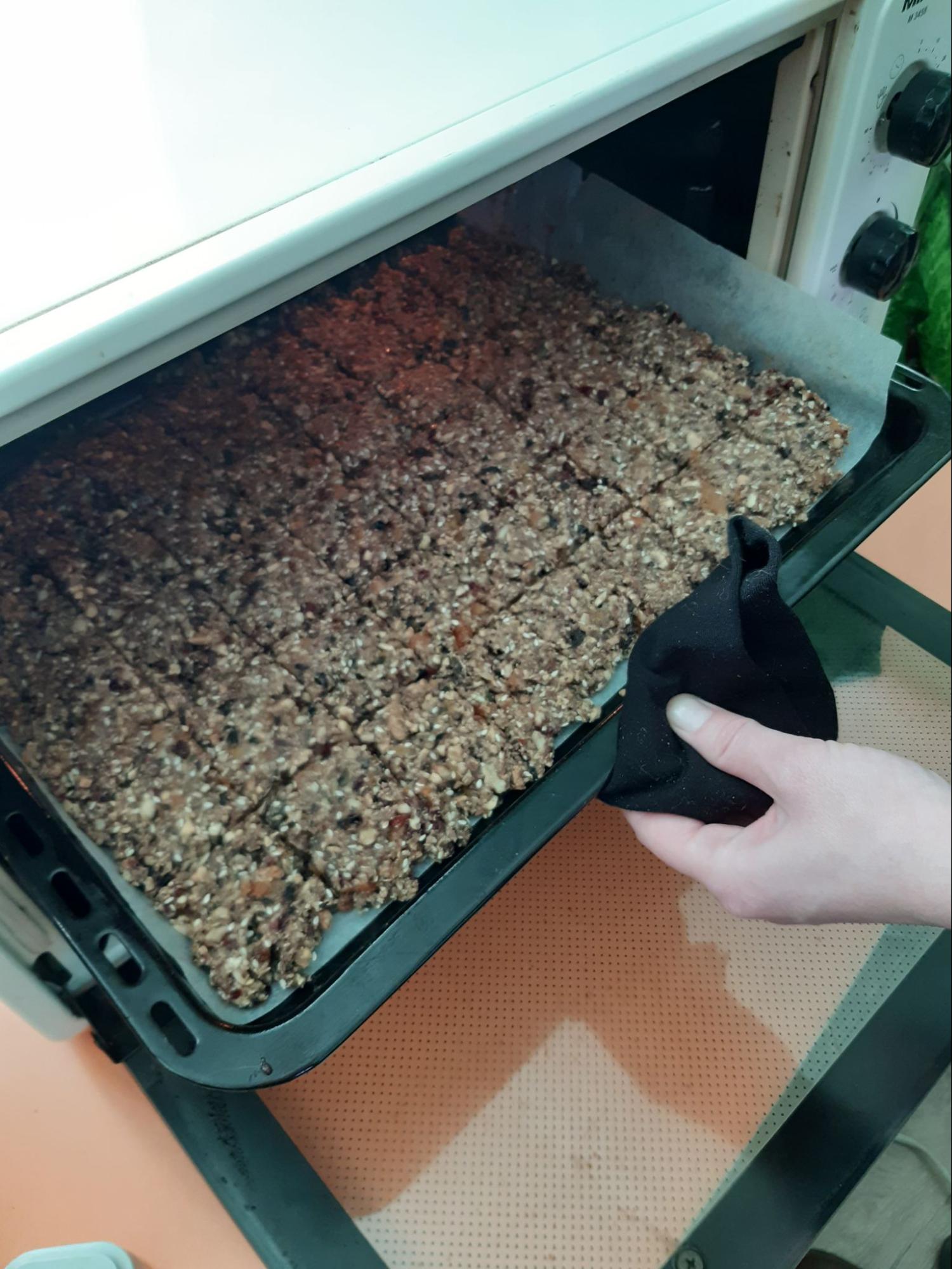
At first, energy bars for the Ukrainian army were made quite simple: oatmeal and nuts. Then the library employees added cranberries, sesame seeds, and dried cherries. Caring townspeople brought products; the villagers gave eggs and one-liter cans of melted lard. They found various traditional and unusual candied fruits, such as carrots and pumpkins. Locals even brought their microwaves and ovens for the needs of the new production!
"Guys from the front sent grateful messages, and we realized we were doing an important and useful thing. So soon, we decided to bake cupcakes as well. We also tried to make bread to order; people brought us two bread makers. However, they produced little bread during the day. It would be enough for ten people. So we make 300 cupcakes daily—two cupcakes each for 150 people," says the library director.
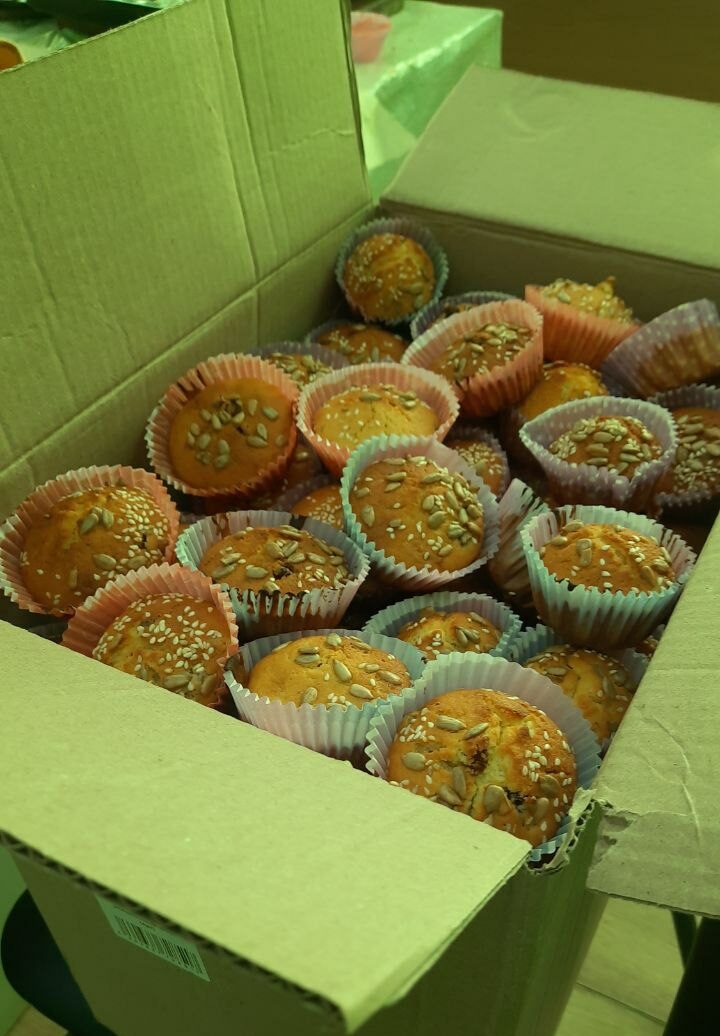
But volunteering in the library is not limited to baking. Three seamstresses are volunteering here, who, since the beginning of the full-scale war, sewed everything that the soldiers asked for and needed for free: balaclavas, bucket hats, and underwear, including for wounded soldiers who were in the hospital. Now they have even begun to sew military ammunition. However, the fabric is expensive, and the companies that produce camouflage are located in Odesa and Kharkiv and aren't working now. So, to continue implementing this idea, they lack only one thing—fabric.
Tetiana Kushchuk explains how it all started:
"Among the library community on Facebook, I saw that our colleague gathered girls who sew underwear and balaclavas. We asked them for patterns. During this period, we sewed approximately 600-700 pairs of underwear. There was a time when they put on this work hold, but we see a new need."
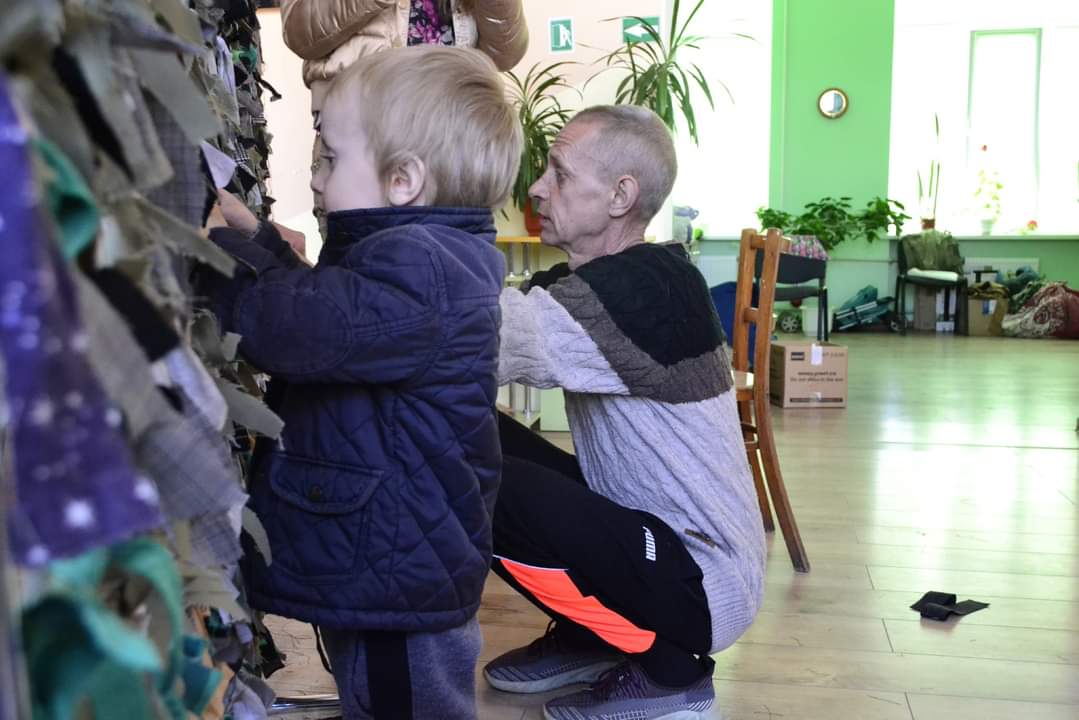
At the same time, the hub began to weave camouflage nets. Girls who weave fabric into a net call themselves "spiders." Now, having already "gotten the hand," they make one net in two or three days. Earlier, it could take a week.
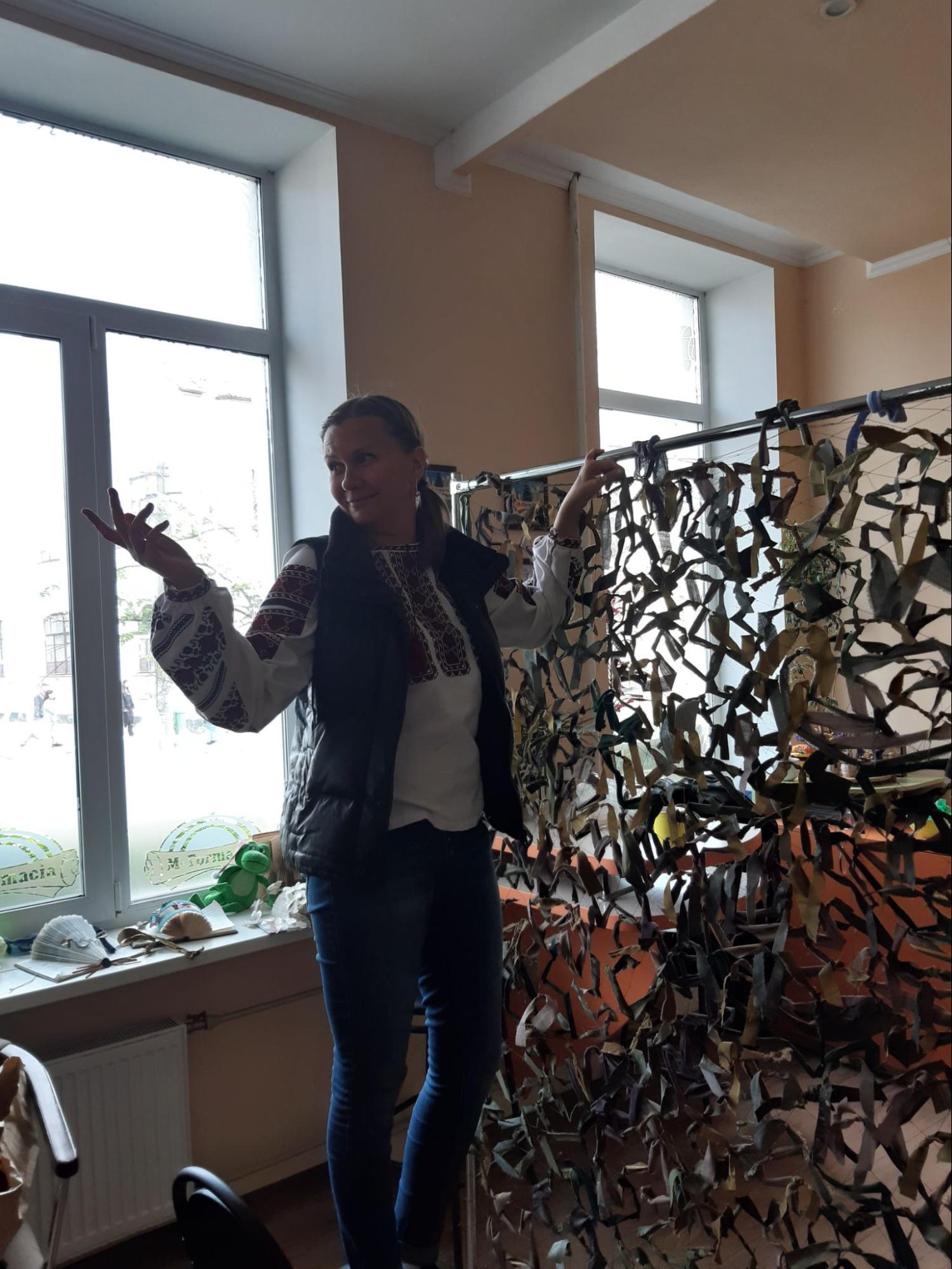
"At work, girls with nets talk, sing songs, and laugh. Although each has some problems in their lives, they never show it. They impregnated the nets with goodness for protection. On this year's Vyshyvanka Day, our embroidery is mesh. Every bow on it is a kind of cross, and everything woven is like a charm," says the director with a smile.
They started making camouflage robes at the military's request two months ago. And for the winter—very soon—they plan to make winter camouflage robes so they will need white fabric.
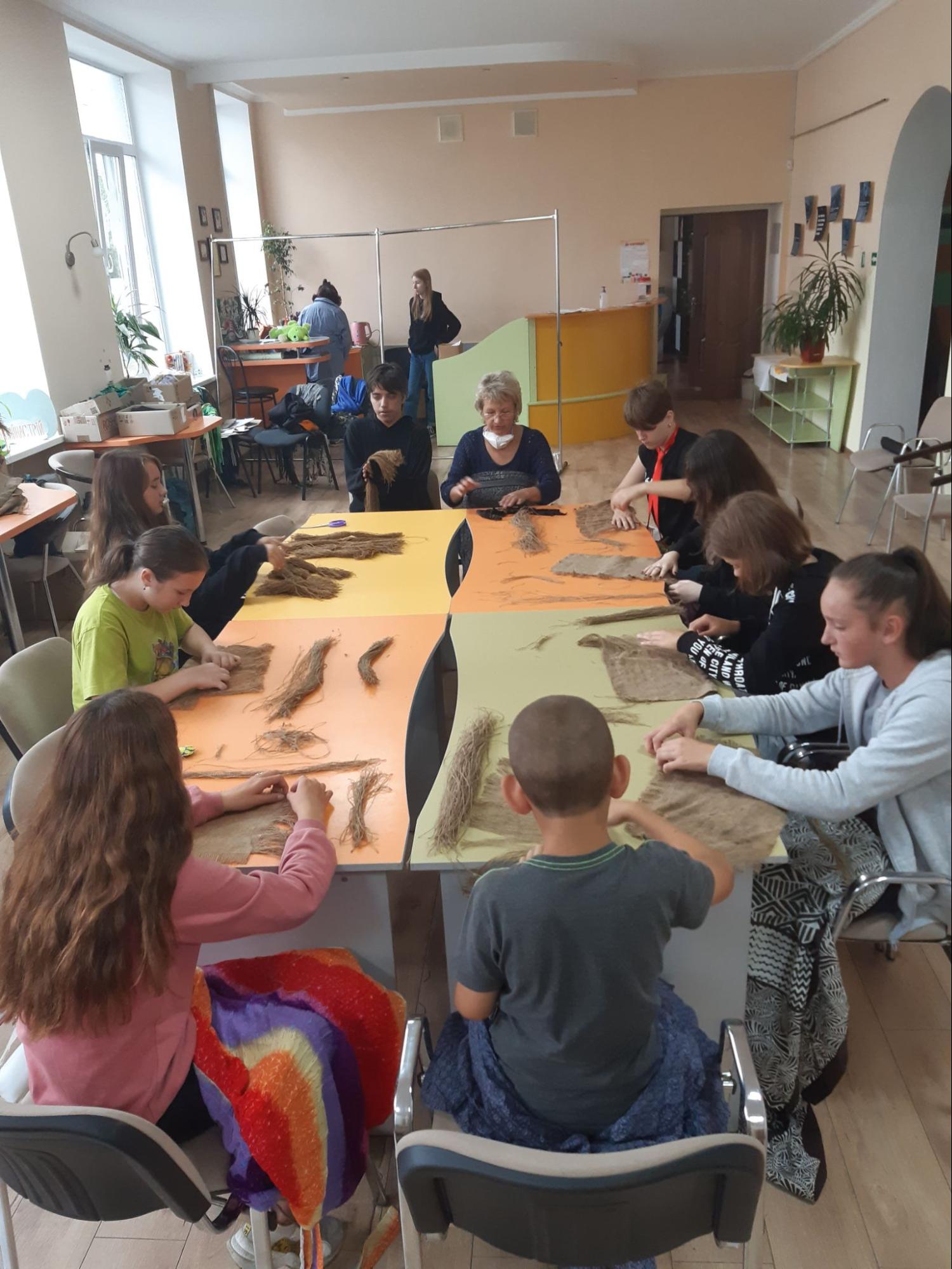
Once, the library learned that soldiers like dry borscht rations on the front lines, so they organized their production of this UNESCO cultural heritage item during the summer. They borrowed a dryer, but they need two more for mass production. So far, the volunteers have already made preparations for 100 servings of vegetarian borscht, but they dream of sponsoring the purchase of meat to make the dish more caloric.
"It's nice that people trust us. Many people used to come to our library in peacetime, which is why they know us and bring aid here. This factor plays an important role. A person comes to a familiar person. People brought us new things, boxes of coffee, oranges, apples, noodles, bags of sugar and flour, which they bought especially for us."
Does it work?
About 50 volunteers are in the library daily; each one works in their niche. People come before the library opens and leave after it closes. They volunteer on weekdays and weekends and sometimes take their work home. Tetiana Kushchuk says:
"There were cases when the boys [soldiers, ed.] informed us that a bus would arrive in two hours. The car had to be hurriedly sent back with help: medicine, food, clothes. We invested our money and posted on Facebook to make it in time. And people responded quickly. The bus has never driven back empty-handed."
A request for help is announced on the Facebook page of M-Formation. However, Ms. Tetiana says people repost more from the personal page.
"Even 20 years ago, when I came here, the state didn't allocate enough funds to libraries. Because of this, we constantly needed to walk with a begging hand to ask for help. With the war, I'm not afraid to do it now. Maybe because I'm not doing it for myself, it's easier to ask for help for someone and explain why we're collecting funds."
Besides, packages with socks, toothpaste, tea, and cigarettes are brought to the library monthly. The librarians say that the most effective way is to ask for specific help, which will come.
Everything that is done in the library requires money. The establishment's team often donates itself: "If we need 5 thousand for fabric, then we can contribute two on our own. We also have a volunteer fairy who constantly helps and supports us. When we buy something for the boys, people often give in. They give the product at cost or give it as a gift."
It was the case, for example, with warm fleece for balaclavas; the library needed it when no shops were open in the city yet, but even so, they could find it with joint efforts. There were also, as Ms. Tetiana calls them, absolute miracles. When the library ran out of threads, which served as the basis for the nets, the director just happened to meet a woman on the street who had what was needed and brought the volunteers about 10 kg of the necessary threads.
The townspeople also brought fabric for nets to the library, but now the team cooperates with a sewing factory.
Library–a social enterprise
Since the beginning of russia's full-scale invasion of Ukraine, the Public Library in Berdychiv has turned into a social enterprise.
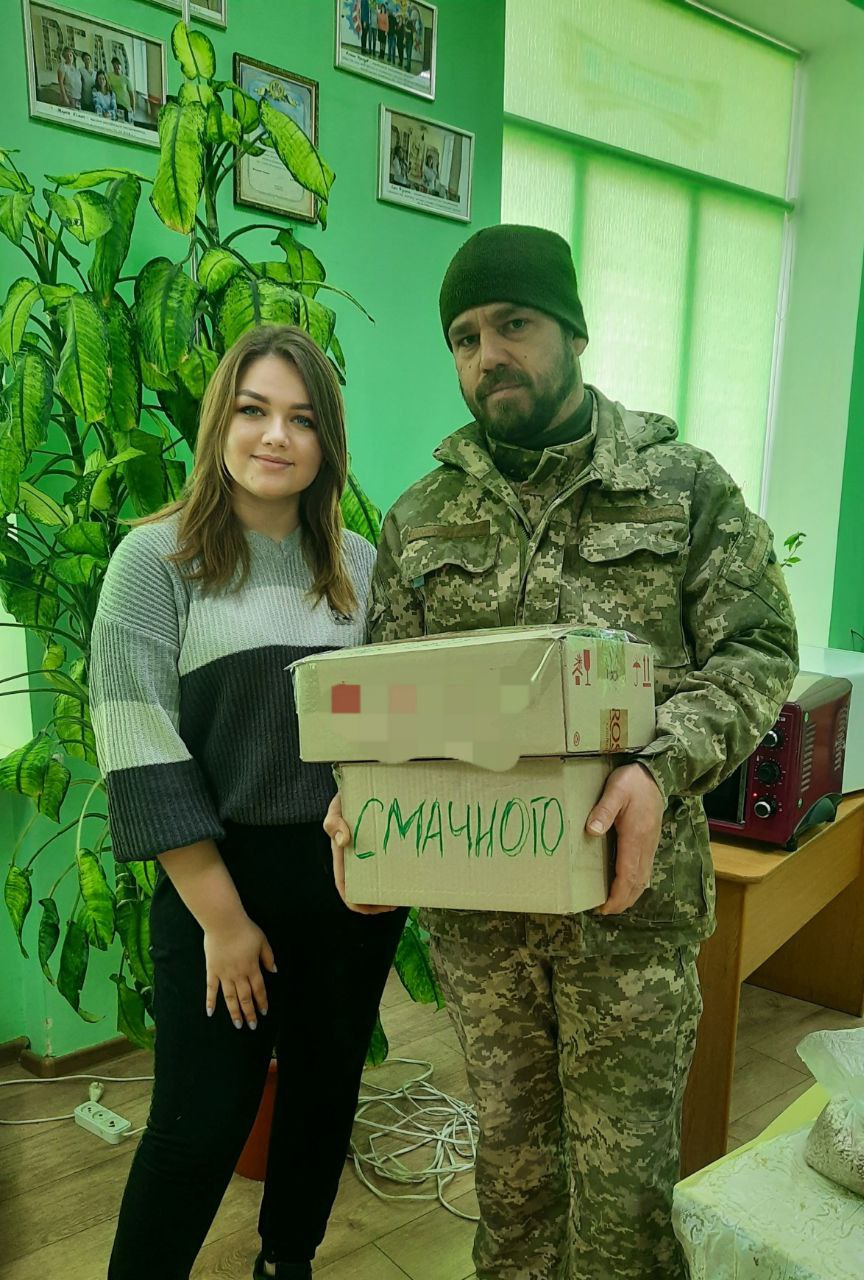
Caring townspeople and migrants come here to help—Tetiana Kushchuk recalls that many who came for humanitarian aid stayed to volunteer. "Helpful people come on their own. For various reasons, they come to the library and stay to help. I know that in peacetime, some people wouldn't sit next to each other at the same table. Now they work together as volunteers," says the director.
They volunteered not only "with their hands"; the library says that since the beginning of the full-scale invasion, the city received many teachers and other specialists from the Kyiv region who began to conduct express courses for local and other displaced persons. It is how they launched English and needlework courses here. It is how the community developed, and the IDPs contributed to the development of the city they moved to.
The library's Youth Center regularly holds costume shows and fairs for children.
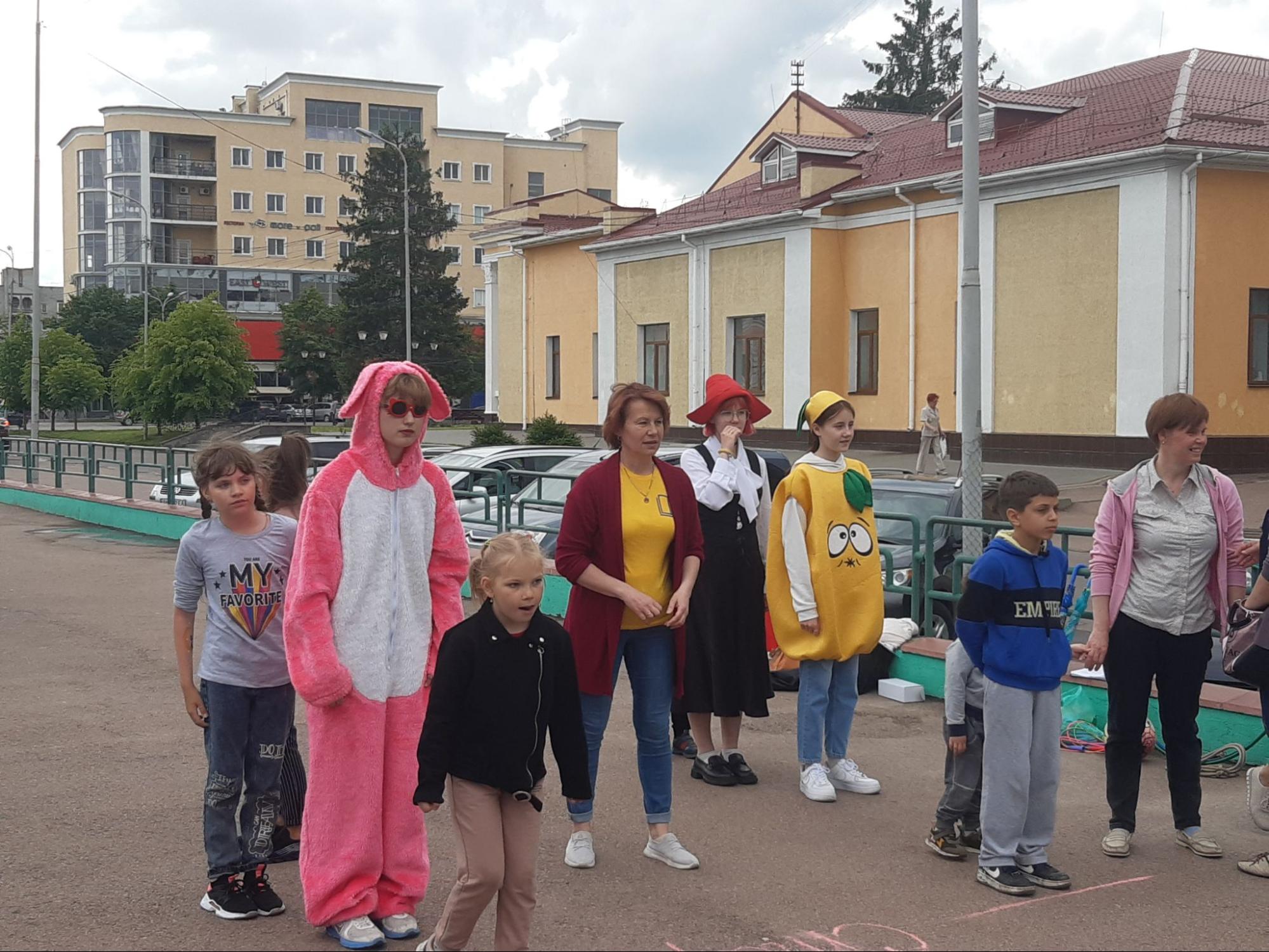
"Before the war, we held a leaders' club and continued it during martial law. Children aged 14 and older attend, and since everyone has their talents, we quickly realized we could organize a charity fair. We worked on it for two weeks. We made frogs, souvenir products, symbols, and charms. We also made a call for more people to join the fair. They brought gingerbread, marshmallows, soap, and paintings," says the library director.
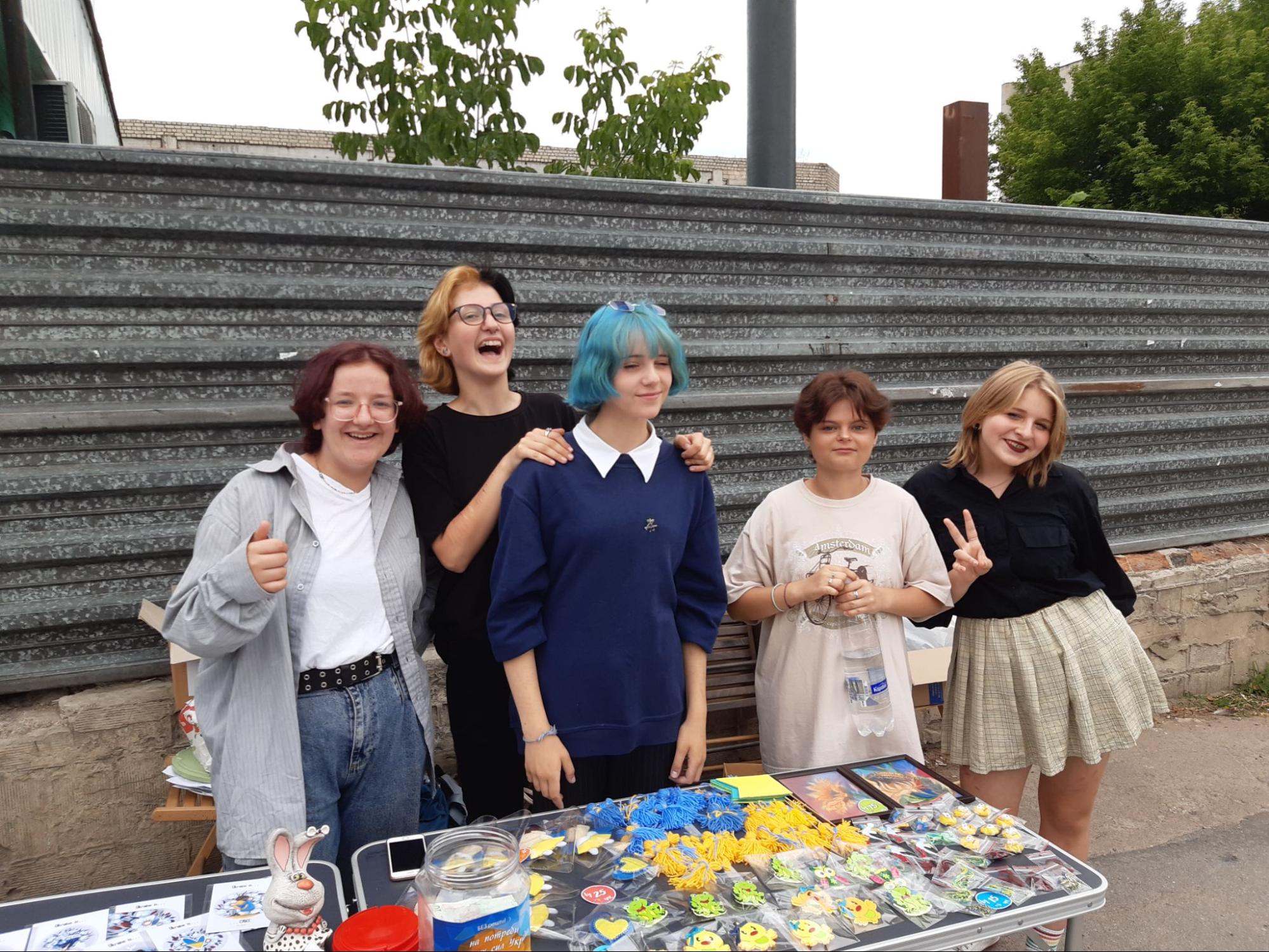
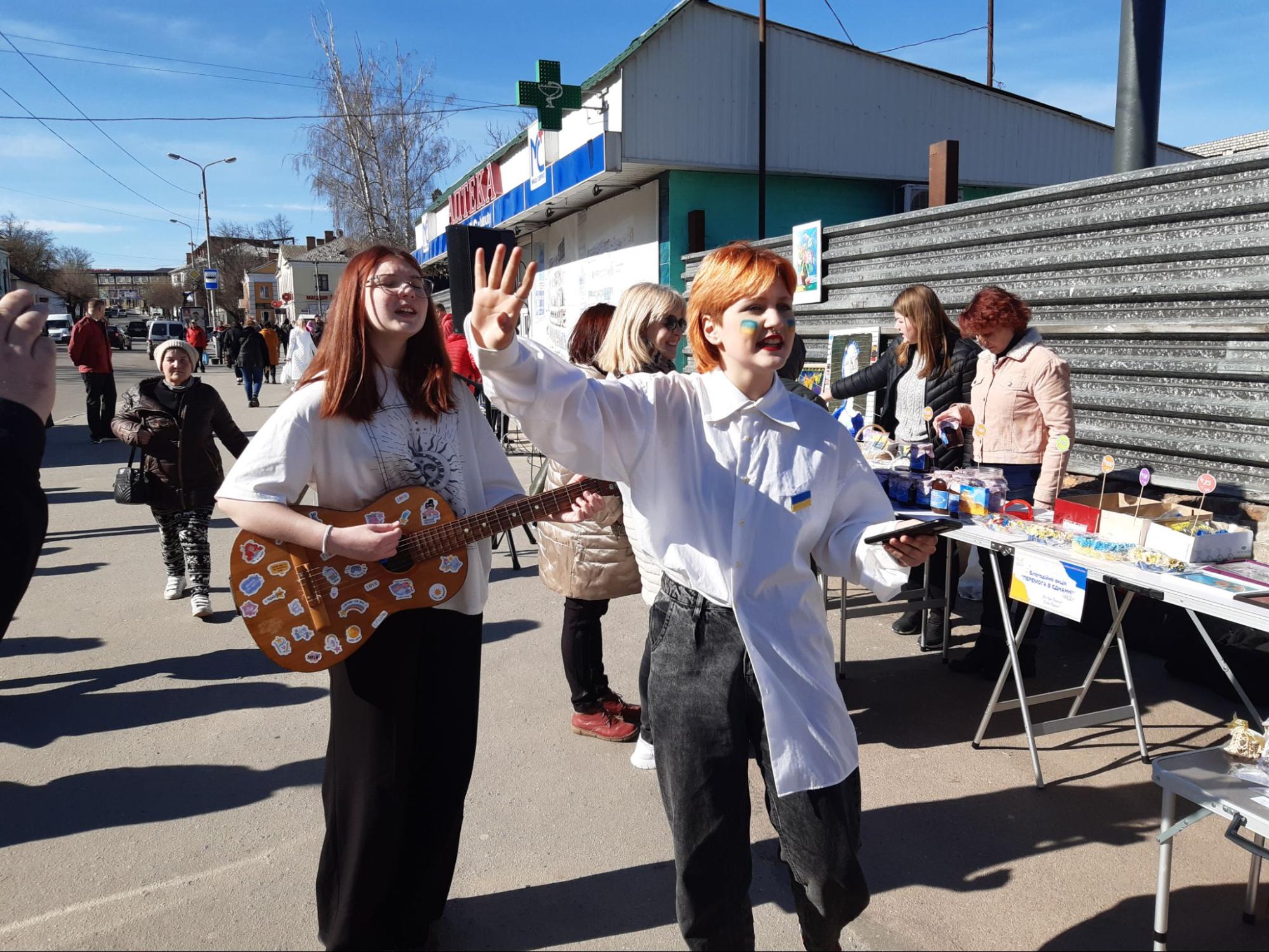
At the first fair, young people earned up to 10,000 hryvnias, which they invested in purchasing a thermal imager for the front line. Now the library is preparing for the 4th fair.
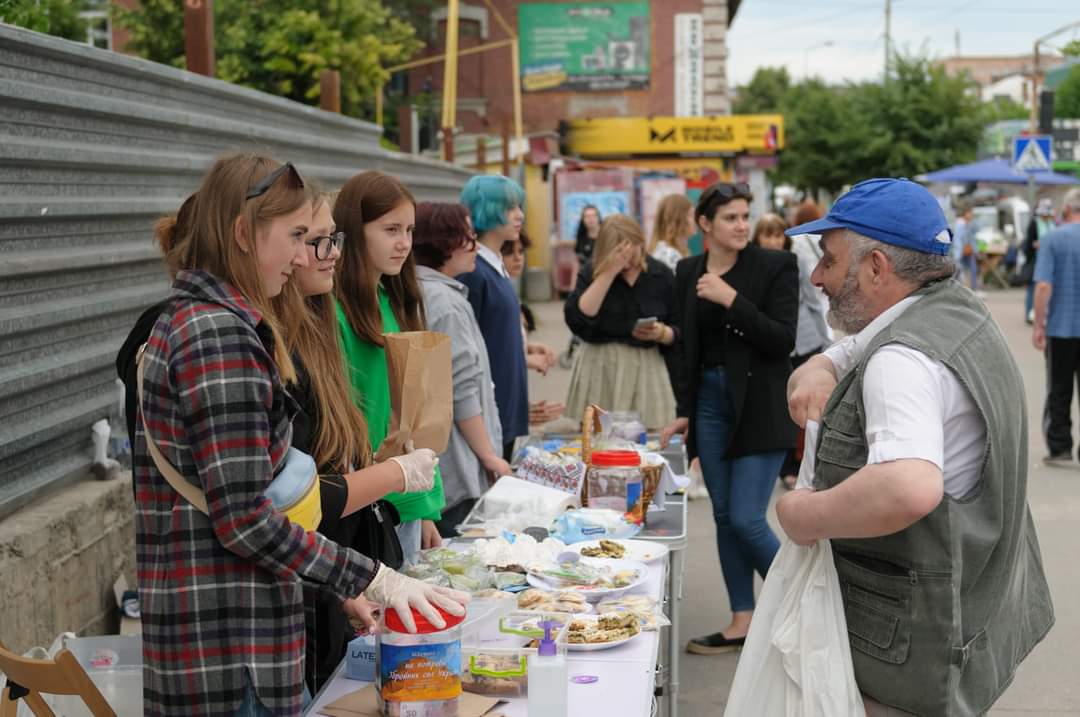
How to help the library?
Volunteers at the library need a dryer, a vacuum packing device, camouflage fabric, and beads, which they can use to quickly collect humanitarian aid and send it on. If you want to help the library with this, please get in touch with the director of the library, Tetiana Kushchuk, at +380682195561, +380967545115, or [email protected].


